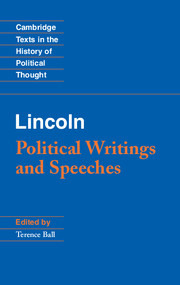Book contents
- Frontmatter
- Contents
- Preface
- Introduction
- Chronology
- Biographical synopses
- A note on sources and abbreviations
- Bibliographical note
- I Political Writings and Speeches
- 1 Autobiographical sketch
- 2 “The Perpetuation of Our Political Institutions”
- 3 Limits of Presidential Power
- 4 Speech on the Kansas–Nebraska Act
- 5 To Joshua F. Speed
- 6 Speech on the Dred Scott Decision
- 7 “A House Divided” Speech
- 8 Portion of a Speech at Edwardsville, Illinois
- 9 Seventh Lincoln–Douglas Debate
- 10 On Thomas Jefferson
- 11 Cooper Union Address
- 12 Speech at Indianapolis, Indiana
- 13 Speech at Independence Hall, Philadelphia, Pennsylvania
- 14 First Inaugural Address
- 15 Message to Congress in Special Session
- 16 Appeal to Border-State Representatives for Compensated Emancipation
- 17 Address on Colonization to a Committee of Colored Men
- 18 To Horace Greeley
- 19 Preliminary Emancipation Proclamation
- 20 Proclamation Suspending the Writ of Habeas Corpus
- 21 Second Annual Message to Congress
- 22 Final Emancipation Proclamation
- 23 To General John A. McClernand
- 24 To Erastus Corning and Others
- 25 To Matthew Birchard and Others
- 26 To James C. Conkling
- 27 The Gettysburg Address
- 28 Third Annual Message to Congress
- 29 Proclamation of Amnesty and Reconstruction
- 30 Reply to the New York Working-men’s Democratic Republican Association
- 31 To Albert G. Hodges
- 32 To Charles D. Robinson
- 33 Reply to a Southern Woman
- 34 “With Malice toward None”
- 35 Speech on Reconstruction
- II Notes and Fragments
- Index
34 - “With Malice toward None”
Second Inaugural Address
Published online by Cambridge University Press: 05 April 2013
- Frontmatter
- Contents
- Preface
- Introduction
- Chronology
- Biographical synopses
- A note on sources and abbreviations
- Bibliographical note
- I Political Writings and Speeches
- 1 Autobiographical sketch
- 2 “The Perpetuation of Our Political Institutions”
- 3 Limits of Presidential Power
- 4 Speech on the Kansas–Nebraska Act
- 5 To Joshua F. Speed
- 6 Speech on the Dred Scott Decision
- 7 “A House Divided” Speech
- 8 Portion of a Speech at Edwardsville, Illinois
- 9 Seventh Lincoln–Douglas Debate
- 10 On Thomas Jefferson
- 11 Cooper Union Address
- 12 Speech at Indianapolis, Indiana
- 13 Speech at Independence Hall, Philadelphia, Pennsylvania
- 14 First Inaugural Address
- 15 Message to Congress in Special Session
- 16 Appeal to Border-State Representatives for Compensated Emancipation
- 17 Address on Colonization to a Committee of Colored Men
- 18 To Horace Greeley
- 19 Preliminary Emancipation Proclamation
- 20 Proclamation Suspending the Writ of Habeas Corpus
- 21 Second Annual Message to Congress
- 22 Final Emancipation Proclamation
- 23 To General John A. McClernand
- 24 To Erastus Corning and Others
- 25 To Matthew Birchard and Others
- 26 To James C. Conkling
- 27 The Gettysburg Address
- 28 Third Annual Message to Congress
- 29 Proclamation of Amnesty and Reconstruction
- 30 Reply to the New York Working-men’s Democratic Republican Association
- 31 To Albert G. Hodges
- 32 To Charles D. Robinson
- 33 Reply to a Southern Woman
- 34 “With Malice toward None”
- 35 Speech on Reconstruction
- II Notes and Fragments
- Index
Summary
Taking the inaugural oath for the second time, Lincoln looked for the larger meaning or purpose of the Civil War, which he had come to see as divine retribution for the sin of slavery. If God willed it the war would “continue, until . . . every drop of blood drawn with the lash, shall be paid for by another drawn with the sword . . .” But if God is wrathful, humans need not be so, as Lincoln says in concluding: “With malice toward none, with charity for all . . .”
Fellow Countrymen:
At this second appearing to take the oath of the Presidential office, there is less occasion for an extended address than there was at the first. Then a statement, somewhat in detail, of a course to be pursued, seemed fitting and proper. Now, at the expiration of four years, during which public declarations have been constantly called forth on every point and phase of the great contest which still absorbs the attention, and engrosses the energies of the nation, little that is new could be presented. The progress of our arms, upon which all else chiefly depends, is as well known to the public as to myself; and it is, I trust, reasonably satisfactory and encouraging to all. With high hope for the future, no prediction in regard to it is ventured.
On the occasion corresponding to this four years ago, all thoughts were anxiously directed to an impending civil war. All dreaded it – all sought to avert it. While the Inaugural address was being delivered from this place, devoted altogether to saving the Union without war, insurgent agents were in the city seeking to destroy it without war – seeking to dissolve the Union, and divide effects, by negotiation. Both parties deprecated war; but one of them would make war rather than let the nation survive; and the other would accept war rather than let it perish. And the war came.
. . .
- Type
- Chapter
- Information
- LincolnPolitical Writings and Speeches, pp. 210 - 212Publisher: Cambridge University PressPrint publication year: 2012



